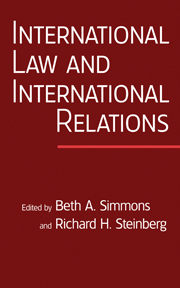Book contents
- Frontmatter
- Contents
- Contributors
- Abstracts
- Preface
- Editors' Note
- PART I INTERNATIONAL REGIMES THEORY: DOES LAW MATTER?
- PART II COMMITMENT AND COMPLIANCE
- PART III LEGALIZATION AND ITS LIMITS
- PART IV INTERNATIONAL LAW AND INTERNATIONAL NORMS
- PART V TREATY DESIGN AND DYNAMICS
- 13 Why Are Some International Agreements Informal? (1991)
- 14 The Politics of Dispute Settlement Design: Explaining Legalism in Regional Trade Pacts (2000)
- 15 Loosening the Ties that Bind: A Learning Model of Agreement Flexibility (2001)
- 16 Driving with the Rearview Mirror: On the Rational Science of Institutional Design (2001)
- 17 The Dynamics of International Law: The Interaction of Normative and Operating Systems (2003)
- PART VI LAW AND LEGAL INSTITUTIONS
- PART VII OTHER SUBSTANTIVE AREAS OF INTERNATIONAL LAW
- References
- Index
13 - Why Are Some International Agreements Informal? (1991)
Published online by Cambridge University Press: 05 June 2012
- Frontmatter
- Contents
- Contributors
- Abstracts
- Preface
- Editors' Note
- PART I INTERNATIONAL REGIMES THEORY: DOES LAW MATTER?
- PART II COMMITMENT AND COMPLIANCE
- PART III LEGALIZATION AND ITS LIMITS
- PART IV INTERNATIONAL LAW AND INTERNATIONAL NORMS
- PART V TREATY DESIGN AND DYNAMICS
- 13 Why Are Some International Agreements Informal? (1991)
- 14 The Politics of Dispute Settlement Design: Explaining Legalism in Regional Trade Pacts (2000)
- 15 Loosening the Ties that Bind: A Learning Model of Agreement Flexibility (2001)
- 16 Driving with the Rearview Mirror: On the Rational Science of Institutional Design (2001)
- 17 The Dynamics of International Law: The Interaction of Normative and Operating Systems (2003)
- PART VI LAW AND LEGAL INSTITUTIONS
- PART VII OTHER SUBSTANTIVE AREAS OF INTERNATIONAL LAW
- References
- Index
Summary
“Verbal contracts,” Samuel Goldwyn once said, “aren't worth the paper they're written on.” Yet informal agreements and oral bargains suffuse international affairs. They are the form that international cooperation takes in a wide range of issues, from exchange rates to nuclear weapons. Take monetary affairs, for instance. Except for the regional European Monetary System, there have been no formal, comprehensive agreements on exchange rates since the downfall of the Bretton Woods system in 1971. A prolonged effort to resurrect the pegged-rate system failed, although new treaties were drawn up and duly signed. Private financial markets simply overwhelmed these official efforts, and central bankers eventually conceded the point. The one comprehensive agreement since then, concluded in 1976 in Jamaica, merely ratified a system of floating rates that had emerged unplanned. For the past fifteen years, monetary arrangements have been a succession of informal agreements of indefinite duration, most recently the Plaza Communiqué and the Louvre Accord, designed to cope with volatile currency movements. The Bretton Woods system itself depended on such agreements in its declining years. It was held together by the tacit agreement of European central banks not to convert their major dollar holdings into gold. The system fell apart when Germany and France abandoned that commitment. They did so because they believed that the United States had abandoned its own (tacit) commitment to restrain inflation and to avoid large current account deficits.
- Type
- Chapter
- Information
- International Law and International RelationsAn International Organization Reader, pp. 293 - 330Publisher: Cambridge University PressPrint publication year: 2007
- 1
- Cited by



